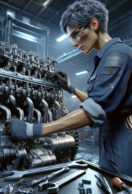The Impact of 3D Printing on Engine Manufacturing and Customization
Recent advancements in 3D printing technology are significantly transforming the auto industry by enhancing manufacturing customization and introducing innovative production techniques. This cutting-edge technology allows manufacturers to produce complex engine components with unprecedented precision, reducing waste and optimizing material usage. By leveraging 3D printing, automakers can now customize parts on demand, tailoring designs to specific vehicle models or even individual customer preferences without the need for costly retooling of traditional production lines. Furthermore, these advancements enable rapid prototyping, which accelerates the research and development process by allowing engineers to test and refine designs more efficiently than ever before. The ability to swiftly iterate on prototypes not only shortens time-to-market but also fosters a culture of innovation within the industry. As a result, 3D printing is paving the way for a more agile and responsive automotive manufacturing landscape, where tailored solutions become standard practice rather than an exception.
Conclusion: Embracing Advanced Engine Technologies for a Sustainable Future in Transportation
In conclusion, embracing advanced engine technologies is crucial for paving the way toward a sustainable future in transportation. As global concerns about climate change and resource depletion intensify, the need for innovative solutions in the automotive industry becomes increasingly urgent. Advanced engine technologies, such as hybrid systems, electric powertrains, and hydrogen fuel cells, offer promising avenues to reduce emissions and enhance energy efficiency.
Hybrid engines combine traditional internal combustion engines with electric propulsion systems to optimize fuel consumption and minimize environmental impact. Meanwhile, electric vehicles (EVs) eliminate tailpipe emissions entirely by relying on rechargeable batteries or alternative energy sources like solar power. Hydrogen fuel cell technology presents another compelling option by converting hydrogen gas into electricity while emitting only water vapor as a byproduct.
By investing in these cutting-edge technologies and supporting research and development efforts, we can significantly reduce our carbon footprint and promote cleaner air quality. Moreover, adopting these advancements not only aligns with global sustainability goals but also drives economic growth through job creation in green technology sectors.
As consumers become more environmentally conscious and regulatory pressures mount worldwide, the transition to advanced engine technologies is not just an opportunity but a necessity. By embracing these innovations today, we can ensure a healthier planet for future generations while revolutionizing the way we move from one place to another.
At All in the Wrist Diesel and Auto Repair in Albuquerque, we can help you with all areas of your gasoline and diesel engine maintenance and repair, contact us to set an appointment.




